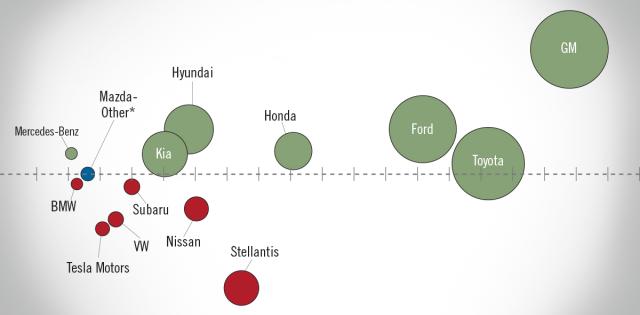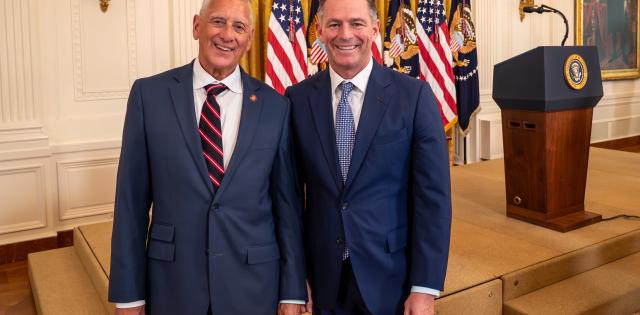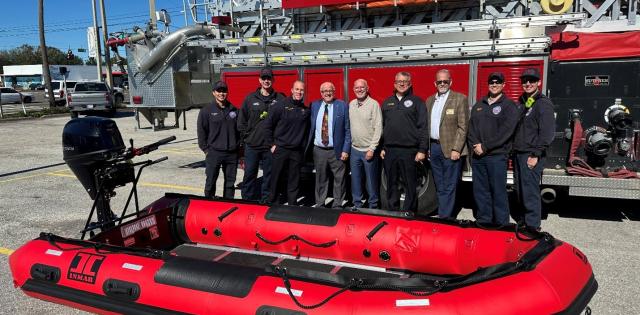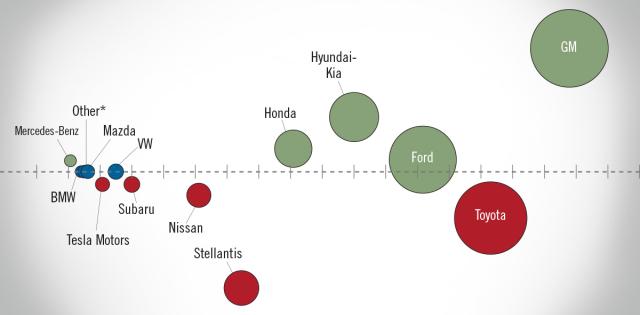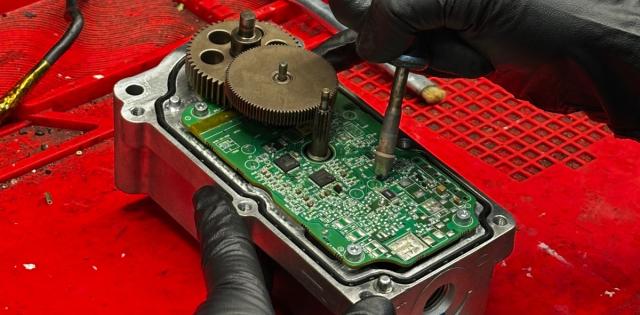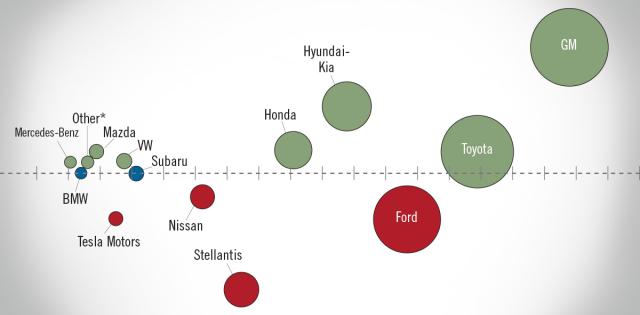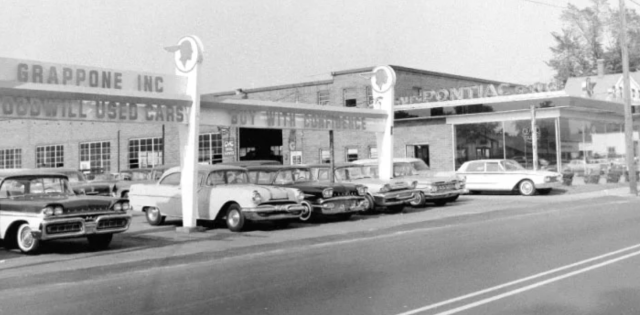On Monday, Aug. 13, 2018, National Public Radio (NPR) aired a story about the Military Lending Act that was riddled with inaccuracies, false statements and misleading claims about the voluntary protection products that millions of consumers have chosen to purchase at franchised new-car dealerships.
Even more astounding than the sheer number of inaccuracies in a single story is the fact every single one was wholly avoidable. On Friday, Aug. 10, NADA Vice President of Regulatory Affairs Paul Metrey, and Tim Meenan, the executive director of Guaranteed Asset Protection Alliance (GAPA), conducted a 60-minute, on-the-record interview with NPR correspondent Chris Arnold, in which they explained in great detail:
- Why changes to the Military Lending Act (MLA) initiated by the Department of Defense during the Obama Administration have resulted in active-duty service members no longer being able to purchase GAP waiver as part of their new-vehicle finance contracts.
- How the DOD has acted far outside the bounds of the normal federal rulemaking process that calls for providing notice and allowing public comment before initiating changes that have significant ramifications in the market.
- Why franchised dealers and the auto lending industry believe this change has put active-duty service members at a distinct disadvantage compared to their civilian counterparts in terms of being able to adequately protect themselves against financial harm in the event of the total loss of a new vehicle.
- The tremendous value that GAP coverage provides.
- The extensive differences between GAP waiver, which is available through dealer-assisted financing, and GAP insurance, which is traditionally offered as a “bolt-on” to an auto insurance policy.
- The superior coverage and protection that GAP waiver provides over GAP insurance.
- How the changes to the MLA initiated by the DOD are inconsistent with the will of Congress.
Regrettably, none of these points were included in the NPR story. Instead, NPR quotes at length so-called “consumer advocates” who push their own agenda through narratives that distort the truth. The result is a slanted story that contains far more questionable and outright false claims than it does actual facts.
The following is a detailed rebuttal to every one of these questionable claims.
(Editor’s note: NADA’s rebuttal includes only those quotes that were provided to NPR during the course of the recorded interview in order to show that NPR had every bit of information it needed to write a balanced and accurate story well before the publication of that story.)
False/Misleading Statement:
"NPR has obtained documents that show the White House is proposing changes [to the MLA]…"
THE FACTS:
During the course of a 60-minute recorded interview (in addition to email correspondence leading up to that interview), NPR never once mentioned or alluded to these “obtained documents.” In fact, as of the publication of this post, NADA has no idea what these documents are or what they say. We certainly have no idea what “changes” these documents propose. The story suggests that NADA is commenting on the substance of the documents and changes, which is of course not true at all because they were never mentioned or shared with NADA or GAPA.
False/Misleading Statement:
"…that critics say would leave service members vulnerable to getting ripped off when they buy cars... 'If the White House does this, it will be manipulating the Military Lending Act regulations at the behest of auto dealers and banks to try and make it easier to sell overpriced rip-off products to military service members,' says Christopher Peterson, a law professor at the University of Utah, who reviewed the documents."
THE FACTS:
Those critics – including Mr. Peterson – offer nothing in the form of proof to substantiate the claim either that service members are “vulnerable to getting ripped off when they buy cars” or that “auto dealers… sell overpriced rip-off products to military service members.” And NPR certainly does not seem to demand or desire such proof or anything close to it.
What’s worse, NADA and GAPA offered to NPR substantial evidence to the contrary.
As NADA’s Paul Metrey explained to Mr. Arnold of NPR:
“GAP [waiver] is a very important product for consumers, including members of the military, because it provides protection in the event of a total loss of a vehicle. Many consumers may not be aware that if their vehicle is totaled or stolen – and of course we’ve seen a lot of this with floods and other [natural disasters] around the country, where someone has lost their vehicle, and it has been declared a total loss – typically what they receive from their insurance company is the fair market value of the vehicle.
“I think we’re all familiar with the fact that vehicles rapidly depreciate, and so typically there is a gap between that amount, the actual payout from the insurance company, and what is owed on the finance contract. And so GAP coverage provides protection for that amount, and in the case of GAP waiver that is offered by dealers, it’s actually even beyond that. If someone has negative equity on a trade-in vehicle, typically [GAP waiver] covers that. And also the deductible that is applied to an insurance policy; typically [GAP waiver] will cover that as well.
“So it’s quite a comprehensive product. And it ensures that someone who is trying to make sure that they’re made whole after one of these unfortunate events, they have the ability to do so.”
False/Misleading Statement:
"Dealers often tell customers that if their car gets wrecked in a crash they could be financially harmed because regular insurance may not pay out the entire amount owed on the loan."
THE FACTS:
This is something dealers tell customers because it’s true. Dealers make no apologies for arming their customers with factual information that allows them to make informed purchasing decisions.
False/Misleading Statement:
"Peterson says some car dealers push this insurance product really hard."
THE FACTS:
This is one of those charges that antagonists want to be true. To them, because it feels true, it must be true. But of course they can offer no proof that it is true. The fact is that these products are 100-percent voluntary. Many customers see the value proposition in them. Many other customers do not or feel they can self-insure, and as a result choose not to purchase them.
False/Misleading Statement:
"'They convince people they've got to have this gap insurance,' [Peterson] says."
THE FACTS:
Contrary to the belief of some, consumers actually have the ability to think critically for themselves. They also have free will. And it just so happens that they exercise both regularly, including during the purchase and financing of a vehicle. Today’s consumers are incredibly informed about the purchasing decisions they make. And, again, dealers make no apologies about providing their customers with information about the types of products they may be interested in. Furthermore, the popularity of these products is not “proof” of aggressive sales tactics; it’s proof that the majority of customers see these products for exactly what they are, which is a smart way to insure a major investment and protect themselves against economic loss.
False/Misleading Statement:
"That kind of insurance can actually be inexpensive. Peterson, who helped write the regulations for the Defense Department, says it often costs as little as $20 to $30 a year and is available from a car buyer's regular insurance company."
THE FACTS:
GAP waiver and GAP insurance are not the same thing, nor do they provide the same level of protection. This point was explained thoroughly and repeatedly by NADA and GAPA, and summarily and repeatedly dismissed (inexplicably so) by Mr. Arnold.
As explained to NPR by Tim Meenan:
“What you’re purchasing at a car dealership in almost all cases is a GAP waiver. And it forces the lender – if you find yourself upside down, your car is totaled, and your insurance company doesn’t pay you enough to pay off the loan – the lender is directly obligated to ‘waive’ that amount and not collect it from you.”
“Generally there are substantial differences between what GAP waiver will cover and what GAP insurance will cover. GAP insurance typically does not cover the deductible, and a GAP waiver does. GAP insurance typically does not cover negative equity – meaning you still owe money on the car you just traded in, and so the new-car loan is now higher – that amount you’re upside down won’t be covered by most GAP insurance, but GAP waiver will cover it.
“There are coverage limits [to GAP insurance]. But GAP waiver has much higher limits. In fact [with GAP insurance] it’s 25% of the actual cash value of the car, whereas GAP waiver is 150% of the actual cash value of the car.
“Another thing to think about is your payment for a GAP waiver covers all of the years covered by the financing. So a military service member that gets a six-year car loan has paid for six years of coverage, and they don’t lose that coverage. But an insurance payment is for one year, and if you switch insurers or change your car insurance, you will lose that coverage. So there are significant differences between GAP waiver available through car dealerships, and GAP insurance.”
False/Misleading Statement:
"'But if you buy it from your car dealer, they may mark it up. ... I've seen gap insurance policies being sold for $1,500' over the course of the loan, [Peterson] says."
THE FACTS:
Again, there is no actual evidence presented to suggest that voluntary protection product are “overpriced.” In fact, there are no prices presented period – beyond the unsubstantiated and anecdotal “I’ve seen” example raised by Mr. Peterson. What’s more, NADA offered ample evidence, through real-life examples, of considerable claims payouts on GAP waiver products. Yet Mr. Arnold chose to ignore these.
“There are very affordable GAP policies that provide extensive coverage for these events that happen all too often,” Metrey explained.
Metrey highlighted three of many available examples of active-duty service members who received substantial GAP waiver payouts – of $7,897, $6,743, and $6,706, respectively – in 2017 after their recently-purchased vehicles were declared total losses. In each of these and the other examples NADA offered to make available in detail to NPR, the service members were able to be made whole through GAP waivers that made up the full difference between their insurance payout and their existing finance contract obligation.
False/Misleading Statement:
"The rules to protect service members effectively block auto dealers from tacking on an extra product — such as overpriced gap insurance — and rolling it into their car loans."
THE FACTS:
This statement is a rather crude bastardization of what has actually occurred since 2015, when the Obama administration initiated changes to the MLA. The accurate history was presented in great detail to NPR by NADA through Paul Metrey:
“Up to this point, if someone engaged in a classic motor vehicle financing transaction – so if you are a covered borrower, and you came to a dealership, and you were purchasing a vehicle, and you obtained optional financing through the dealer, and the dealer also included in that GAP or other products that you elected to purchase and finance – that was something that was not covered by the Military Lending Act [because of the Act’s statutory motor vehicle financing exclusion].
“However, in December 2017, for the first time DOD… said that if GAP is included, it takes the transaction outside the motor vehicle financing exclusion. Which means that with the stroke of a pen, overnight, on Dec. 14, 2017, dealers and others that were including GAP as part of a financing contract with a covered borrower had to abide by the Military Lending Act duties and restrictions.
“And the reason that was a concern from a process standpoint was that this was issued without notice, without comment, it was issued by an agency that of course covers many things that they have substantive knowledge on, but consumer credit is not an area where they’re well-versed, and I think DOD would be the first one to acknowledge that, and they were issuing something that changed a substantive standard overnight.
“It was saying that if you are financing GAP to a member of the military or that person’s dependent, you now have to abide by these duties and restrictions. And by the way, unlike most new standards that take effect in a federal rulemaking process, where you have say 180 days or three months or perhaps longer to try to adjust and comply, this was in place immediately. There was no lead-up or anything else.
“From a substantive basis, it also was flawed. First, we certainly believe, and we think many others would join us in this assessment, that the interpretation is not consistent with the will of Congress. Congress in essence said that if you are securing a financing commitment for a motor vehicle with the motor vehicle itself, it comes within the exclusion…”
“The concern is that now that the financing of GAP, a very important product for service members, is now something that would subject a creditor, a dealer, to the restrictions of the Military Lending Act. And one of those restrictions is the dealer or any other non-depository institution cannot take a security interest in the vehicle being financed… It is economically unviable to engage in the extension of credit [for a motor vehicle] where you cannot secure it with the motor vehicle being financed. Nor will the finance companies take assignment of the credit contracts from dealers – and we’re talking about banks and finance companies and credit unions – because they will not be able to have a security interest in the underlying vehicle.
“So in order to avoid this economically unviable situation, the only way to proceed is to not include the offer of GAP waiver in a credit contract to a covered borrower. And that’s most unfortunate, because service members certainly should have the same access to credit protection that their civilian counterparts have. And now when they engage in these transactions, this valuable GAP waiver product is effectively not available to them as of the date of this interpretation.”
False/Misleading Statement:
"The industry has been lobbying to change that, and the White House appears to be sympathetic. The administration just sent the latest version of a proposal to the Defense Department, and documents show that it would give car dealers what they want. Peterson says the revised rules could also allow dealers to roll in all kinds of other add-on products."
THE FACTS:
The above statement is a complete misrepresentation of both the current situation, and what NADA and the auto lending industry have asked the Department of Defense to re-examine. As explained to NPR by NADA’s Paul Metrey:
“The problem is that service members who want to protect their entire investment, that want to protect against a loss, and they want to make sure they’re made whole, are unable to do so. If they want to get the most valuable product they can get, from an auto dealer, where they can have credit exposure – the credit difference – waived, and have that taken care of, it’s not something that is available as a result of this interpretation. And if they try to obtain a product elsewhere that provides coverage, they may get coverage, but it’s very unlikely they’re going to get similar coverage. And if the whole purpose is protect any liability you have if your car is totaled, unfortunately they’re going to fall short of the mark as a result of this interpretation.
“The Department of Defense issued an interpretation that disrupted an efficient market that provides great value to consumers, and unfortunately the issues that have resulted from that are being discussed after the fact and not before the fact. They issued an interpretation without notice, without the opportunity to comment, it took effect immediately, and it had an immediate effect on the marketplace. And that’s really unfortunate because it caused a shift in valuable protection products, optional protection products, that [were] offered to service members. Their access to them is much less than it was prior to the interpretation going out, and consequently their ability to be protected, from a military readiness standpoint, unfortunately is now impeded, whereas previously they still had the ability to get this protection. That is unfortunate.
“Hopefully DOD will withdraw what they’ve issued and take a much more meaningful look at this where they get input from everybody involved as they try to decide how to move forward.
“The National Automobile Dealers Association and at least five other trade associations that represent financial service providers – and those are all types of financial service providers, to include the Defense Credit Union Council, that represents military credit unions – all have asked the Department of Defense to withdraw the uninformed and problematic interpretation, and if they chose to offer another interpretation, to do it with notice and comment, taking viewpoints from everyone involved, and then move forward in a much more deliberate and informed manner.”
False/Misleading Statement:
"Peterson says service members can still get this kind of insurance elsewhere, and often at a much better price… 'If somebody really wants to have some gap insurance to protect them from this situation, they should just go to their insurance company and buy it,' he says."
THE FACTS:
As GAPA’s Tim Meenan explained to NPR, “[t]he insurance coverages [referenced by Peterson] are simply not offering anywhere near the amount of coverage that the GAP waivers available through car dealers cover. There’s a reason why something is substantially cheaper, and that’s the reason.”
“If you found an insurance product that covered all of those things like deductibles, negative equity, coverage limits, coverage period – when you find an insurance product that covers those same high-dollar amounts on the claims that we were talking about earlier, you’ll find that it costs a lot more than $100.”
If you'd like to learn more about voluntary protection products, visit the Voluntary Protection Products Coalition at voluntaryproducts.org.


